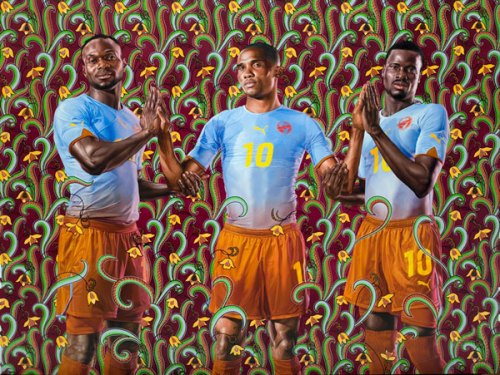
The German shoe and sportswear company, Puma, sponsors at least 12 African national football teams–five of which qualified for the 2010 World Cup. To commemorate the World Cup year (and because it is good PR and to sell shirts), Puma commissioned artist Kehinde Wiley to create four new works of arts inspired by the footbal stars Samuel Eto’o of Cameroon, John Mensah of Ghana and Emmanuel Eboué of Ivory Coast. Wiley painted individual portraits of the players and a fourth painting (above) of the three players “symbolizing the united countries of Africa.” The players are wearing the “Unity” kit, a limited edition uniform designed to be a third kit (apart from home and away kits) shared by all African teams, symbolizing unity.
Here‘s a link to a video of Wiley at work on the project with Mensah, Eboue and Eto’o.
The paintings will be exhibited during the World Cup in South Africa.
Category: Players
Who Will Forget The Captain is Black?
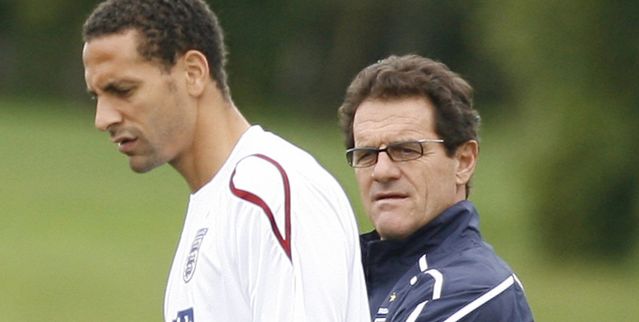
The odious John Terry has been relieved of his duties. There was always something wrong about a character like John Terry lifting the World Cup in South Africa. Fabio Capello has reportedly chosen Rio Ferdinand to replace him. A Black England Captain leading the Three Lions in Africa! If Captain Rio lifts the World Cup, who will “forget” he is black?
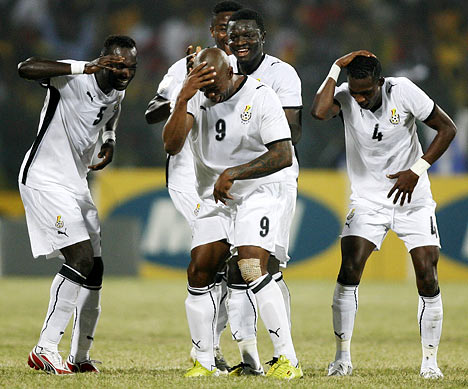
Can Africa’s World Cup qualifiers respond and take their game to a higher level. There were precious few clues in Angola to suggest they could. One would tend not to identify Pussy Cats, Super Turkeys and Tuskless Elephants as World Cup winning species, but if Cameroon, Nigeria and Cote d’Ivoire apply themselves like Black Stars they could move beyond the shadow of the Pharoahs and rediscover their fierceness.
The Black Stars were not predicted to shine in Angola. A significant number of their established names were injured or sulking. But with Milovan Rajevec, an old Yugoslav in command of the x’s and o’s, and a squad of U20 World Cup winners to choose from, folks should not have been so surprised. There has been plenty of talk of those who filled the boots of Appiah, Essien, Mensah and Muntari. Agyemang-Badu, Asamoah, Ayew and Inkoom are now household names, the equal of any Pharoah or sulking star. Ghana’s graduates will give pause to Australia, Germany and Serbia, who should note the Pharoahs may not have been so pleased with themselves if Rajevec had also introduced goalkeeper Daniel Adjei and centre forward Dominic Adiyah. Ghana were just an Adjei fingertip and an Adiyah toe poke away from closing down the party at Club Pharoah.
So how will Les Éléphants, Les Lions Indomptables and Super Eagles respond to their inglorious exits from Angola? Will they promote from their junior ranks? Will they advertise for an old partizan with a chalkboard? They could do all of the above, but nothing will change for them if the likes of Drogba, Eto’s and Yakubu don’t believe.
Props to the Pharoahs!
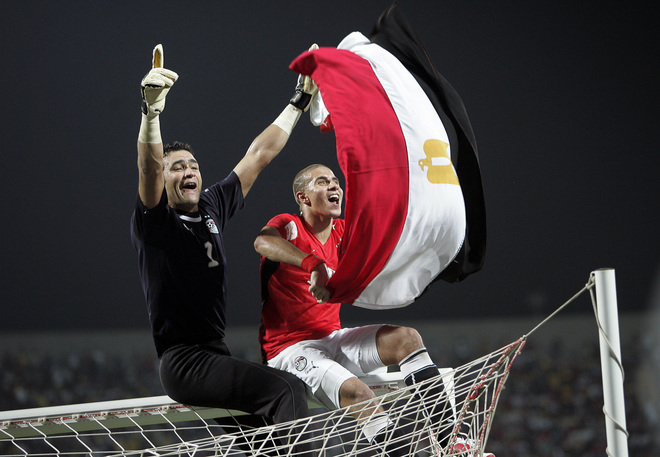
The 2010 African Cup of Nations provided a political appetizer to Africa’s first World Cup. A stubborn stain remains, but it should not distract from Egypt’s remarkable three consecutive African Nations Cups.
Props to the Pharoahs! Hassan Shehata had them playing some seriously penetrating football. They were passing and moving like a Bob Paisley machine — and that’s the highest of all high compliments one can make about a football manager. Aboutrika, Mido and Zaki, all seemed like yesterday’s men, as precocious and timely talents like Shikabla and Geddo combined with creative mainstays like Hassan, Motaeb and Zidan to persuade the ball into their opponents net. Gomaa and El Hadary ensured there would be few arguments at the other end. The Pharoahs will be missed in South Africa, especially when some European adventurers hack their way South in search of the treasure that is avoiding defeat.
And how will Africa’s World Cup qualifiers respond? The Pharoahs provided a clinic, but there were also important lessons to be learned from the performances of Malawi and Zambia. In a word: BELIEVE.
What Were They Thinking?!
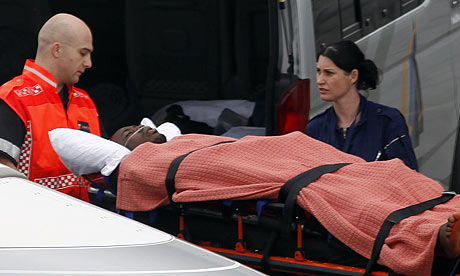
The Confederation of African Football (CAF) banned Togo from the next two African Nations Cup tournaments and also imposed a $50,000 fine. “This decision is outrageous,” said Togo captain and Manchester City striker Emmanuel Adebayor to the French newspaper L’Equipe on Sunday.
Togo returned home from the Nations Cup two days before the kickoff after two members of its delegation were killed in a terrorist attack on January 8 in Cabinda. CAF’s reason for punishing the victims is that it views the Togolese government’s decision to recall the team as ‘political interference’ in football affairs. The Togolese government intends to fight what it called the ‘insulting’ sanctions.
There have been goals in Benguela, Cabinda, Luanda and Lubango, but no goals are being scored in the Stade Slyvio Cator in Port-au-Prince. Haiti’s goalposts don’t exist anymore.
Angolans paused for Haiti before every Quarter Final, the carnage of their own wars against colonialism and as proxies in the Cold War never far from their thoughts. A nation blessed by the curse of geology showing solidarity with their brothers and sisters, torn asunder by the earth’s crust, an ocean apart.
France, Britain and the United States have a history of moving Haiti’s goalposts, naming and renaming Haiti’s coach and officials, tightening the touchlines, painting countless penalty spots across Haiti’s box, forcing Haitians to cheer from terraces made from shaky dumps of their own subsidized imports, with many supporters not able to read the terms and conditions of their own oppression as laid out in the match programme.
Haiti’s goalposts don’t exist anymore. The smashed and mangled uprights belong to the “Humanitarians” now. The Stade Slyvio Cator is a tent city with thousands crammed into the spaces once created by Haitian footballers. There are no calls for the ball, but for water, medicines, medical attention and food.
Like the African Cup of Nations, Haiti’s disaster is being broadcast across our globalized world. The world knows more about the grain and scale of Haitian suffering than any calamity it has ever encountered.
Our goal must be to help Haitians restore their own goalposts, and one day when Haitians are replenished with food, water, housing and control over their own lives, we can celebrate Haitian goals again.
Arsène’s Respect for Africa
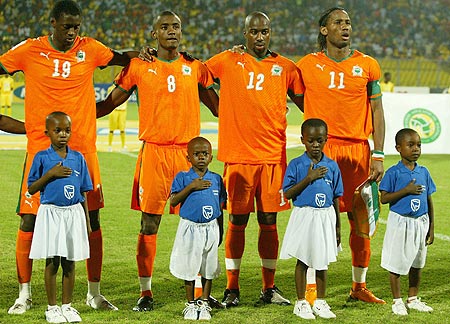
The response to the attack on the Togolese team from much of the rabble that constitutes the English Premier League was predictable. The emirs and oligarchs did not say much, leaving it to some of the old fashioned brass merchants to bellow about bringing their players “home”.
Arsène Wenger was not of the same mind.
When asked if he wanted to bring his players back to Britain (where let’s not forget Irish continuity forces still use the occasional bullet and bomb), Wenger was a beacon of sensibility and preferred to express his respect for Africa.
“We won’t be asking Fifa to release them, and I’ll be happy for Eboué to play in Cabinda on Monday,” said Wenger. “I believe it would be disrespectful to Africa and the Africa Nations Cup [to bring them home]. You can’t always encourage Africa to develop and if something happens say ‘come back to Europe’.”